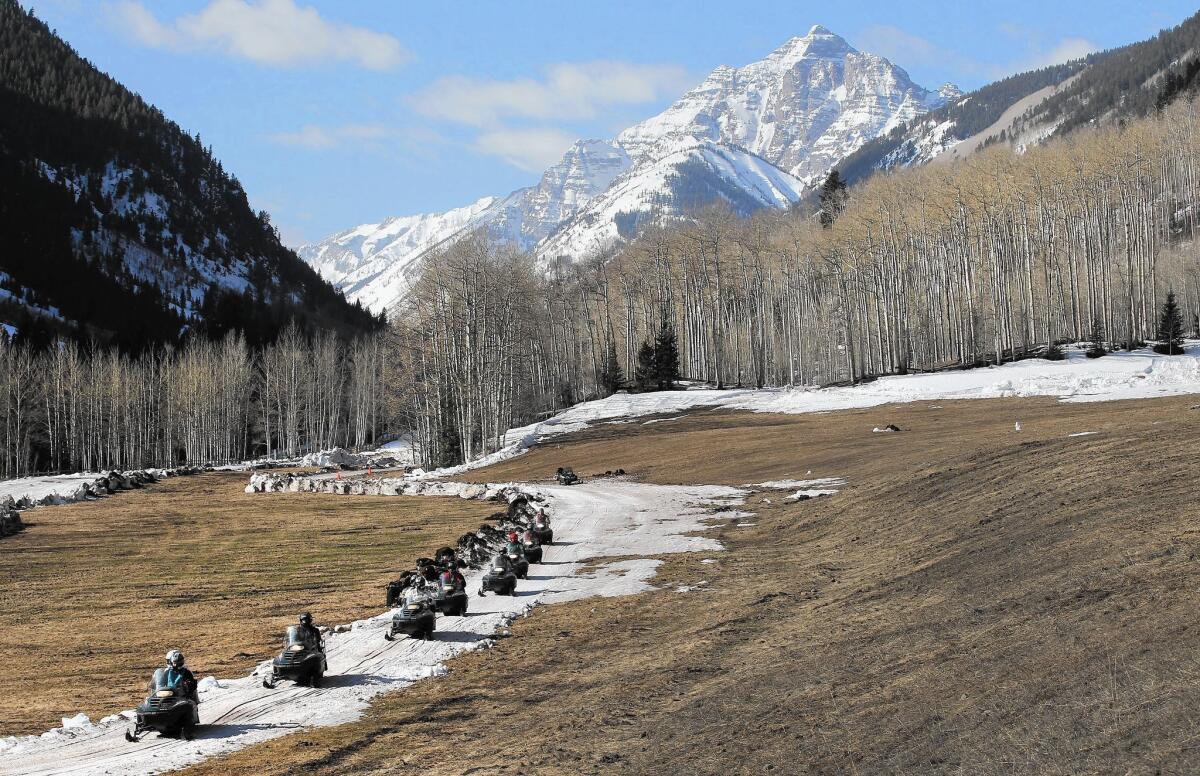Rocky Mountain resorts race to defend their businesses against climate change

Aspen, at nearly 8,000 feet elevation, now averages 23 fewer days below freezing each year than it did before 1980, making snowfall more unreliable.
- Share via
reporting from ASPEN, Colo. — Not everyone arriving in this Rocky Mountain resort steps from a private jet.
Ashley Perl bikes or takes the bus into town from her two-bedroom home in a subsidized neighborhood built for year-round workers. She grew up here, raised by parents who ran a modest cafe and socialized with a local folkie, John Denver. For her, Aspen is home and a place to make a living, not an exclusive escape.
------------
FOR THE RECORD
Climate change in Mountain West: In the July 28 Section A, an article about mountain towns facing climate change provided incorrect information about projections for the potential temperature increase in Aspen, Colo. A study conducted for the ski resort town projected that temperatures could rise by 9 degrees or more by 2100, not 2050. The study projected that temperatures could rise by as much as 6 degrees by 2050.
------------
Like many longtime residents, Perl wishes things were more like they were in the old days. But the changes that worry her the most are not that the wealthy have crushed the spirit of the place, or that preposterous home prices will make it impossible to raise a family. She worries instead about what even the most affluent Aspenite appears unlikely to avoid: climate change.
NEWSLETTER: Get the day’s top headlines from Times Editor Davan Maharaj >>
Aspen, at nearly 8,000 feet elevation, now averages 23 fewer days below freezing each year than it did before 1980. If global action is not taken to reduce greenhouse gas emissions, the average temperature here is expected to rise as much as 9 degrees by 2050.
Government officials and business owners in other resort towns at high elevations in the Mountain West say they are facing similar conditions and forecasts. Many already are seeing increasingly unreliable snowfall, rivers rushing at unusual times and wildfires creeping ever closer.
Perl, who was hired two years ago as Aspen’s climate action manager, is among the leaders of a multilayered and often unified effort among resort towns to try to slow and defend against climate change while adapting economically to a world in which snow falls less predictably and summer tourism becomes increasingly important.
“From my perspective, we’ve got 20 years of good winters that are highly likely,” said Matt Abbott, environmental project manager for Park City, a ski resort about 30 miles east of Salt Lake City. “Beyond that, where are we at?”
Some mountain resort towns are lobbying in Washington to discourage the mining of coal, a key culprit in climate change, and to urge more wildfire prevention. Others, including Aspen, are looking to bolster basic infrastructure such as water supply to prepare for the many second-home owners who may be spending more time in the mountains if places like Houston or Phoenix become too hot.
Fishermen, wildlife biologists and tour guides in Idaho are monitoring rivers out of concern that warming water will hurt trout runs. Ski slope managers are working on ways to make snow quickly in narrower windows of cold weather. One company, Vail Resorts, has hedged its bets by acquiring other resorts around the world.
Many of the West’s best-known mountain ski towns — including Vail, Durango, Telluride, Jackson Hole and Park City — have long since shifted from being winter resorts to year-round destinations with a growing number of year-round residents.
“It’s not just the tourists going to ski or mountain-bike in these elite destinations, but there are also entire communities relying on hotel jobs, rafting jobs, working at a ski lift,” said Diana Madson, executive director of Mountain Pact, which works on issues including coal, wildfires and water supply. “There are a lot of people who are vulnerable to these impacts.”
Brian McInerney, senior hydrologist for the National Weather Service in Salt Lake City, said areas of the Wasatch Mountains that have historically been 90% covered in snow during the winter are expected to be as little as 50% covered in 2035, depending on the rate at which temperatures rise. Much of Utah and elsewhere in the arid Intermountain West are forecast to warm faster than other parts of the world. How will ski towns remake themselves in a rainier future?
Many towns have long worked to expand summer tourism out of a general ambition to grow, and some places already have more visitors in summer than in winter. In Telluride, in southwestern Colorado, Mayor Stu Fraser said the city increasingly emphasizes its summer film and bluegrass festivals that have brought in record crowds in recent years.
“Part of that is our desire to make sure we don’t end up just relying on winter, because we know the change is taking place,” Fraser said. “We see and feel it.”
Last year, the U.S. Forest Service finalized new rules to allow the more than 120 ski areas that use Forest Service land to develop summer recreation activities, including zip lines, mountain biking, disc golf and rope courses. The rules followed congressional passage of the Ski Area Recreational Opportunity Enhancement Act of 2011, which was supported by the ski industry. The industry has suffered from a long-standing decline in the number of people visiting resorts, but also from shorter skiing seasons.
Yet tilting toward summer presents new issues. Some resort areas cite studies showing that a family of four on a winter ski trip spends an average of $10,000 during a week’s stay, but that summer visitors — mountain bikers, rafters, hikers — average just a few hundred dollars a day. Summer is also when trees dying from infestations of the mountain pine beetle, enabled by climate change, are more likely to be unattractively exposed instead of covered by picturesque snow.
And then there are the wildfires. In September, the Ironman Lake Tahoe triathlon was canceled at the last minute out of concern about poor air quality from the nearby King fire.
“If our hillside is brown for multiple summers, we have to be honest that that would affect our tourism,” Perl said. “And if our hillside is burned and it rains a lot, well, now we have mudslides.”
In the Sun Valley area of Idaho, where temperatures are expected to rise 4 to 11 degrees by 2070, snow is melting earlier than usual, upending the area’s ski season, its water supply (it does not have reservoirs) and the timing and amount of river flows. That, in turn, has affected popular summer floats down the scenic Salmon River and reduced streams that nurture the area’s famous trout fishing.
Local officials say the Beaver Creek wildfire in August 2013 cost the area $40 million. After suffering through wildfire smoke several times in recent years, the Sun Valley Writers’ Conference moved its annual meeting from August to early July.
Yet even as some make adjustments, other resist. It remains a struggle to persuade wealthy homeowners, many of whom are not permanent residents, to limit landscape watering and other water use.
“They haven’t connected to the problem,” said Mayor Nina Jonas of Ketchum, Idaho. “Like, ‘What? We can’t play golf?’”
In April, business, government and nonprofit groups formed the Sun Valley Institute for Resilience, which focuses on preparing for climate change. The Ketchum Innovation Center started as a way to create local businesses that are not tourism related. The goal at the time was straightforward: help year-round residents find work that pays better than ski resort jobs.
“That quickly morphed,” Jonas said. “It turned into, ‘We need to bolster ourselves for a changing economy due to a changing climate.’”
Twitter: @yardleyLAT
ALSO:
A weeping Joyce Mitchell pleads guilty to helping killers escape N.Y. prison
LaGuardia: No more ‘third world’ airport? Cuomo, Biden say it’ll be rebuilt
Boy Scouts lift blanket ban on gay leaders, will allow exceptions
More to Read
Sign up for Essential California
The most important California stories and recommendations in your inbox every morning.
You may occasionally receive promotional content from the Los Angeles Times.














